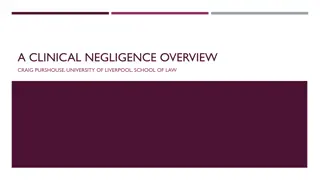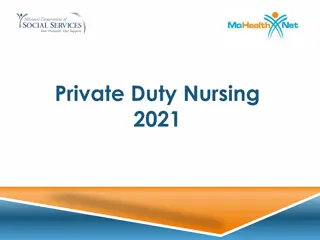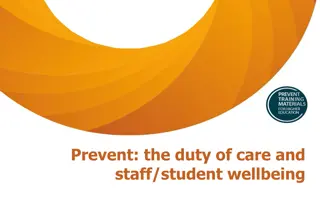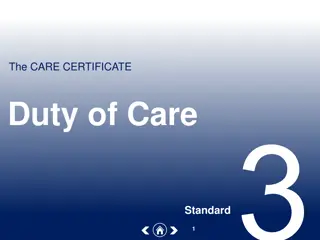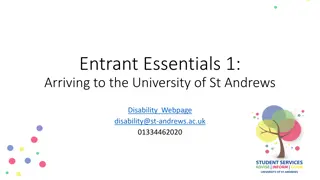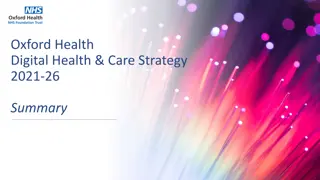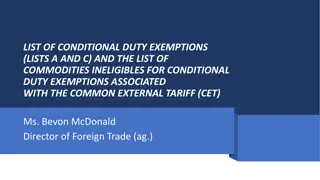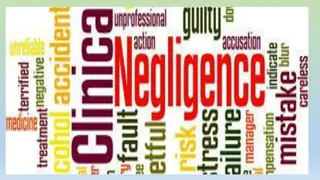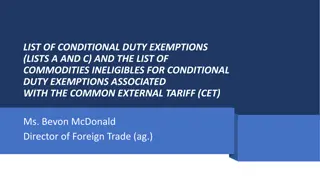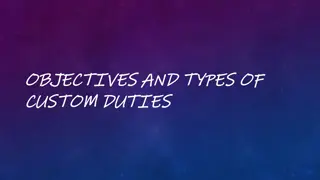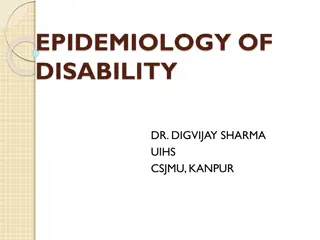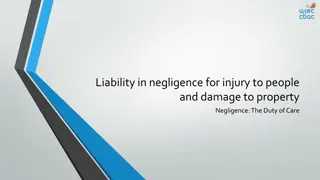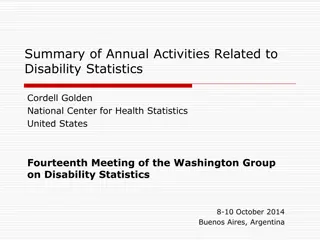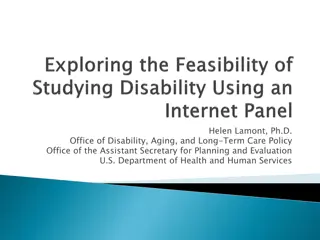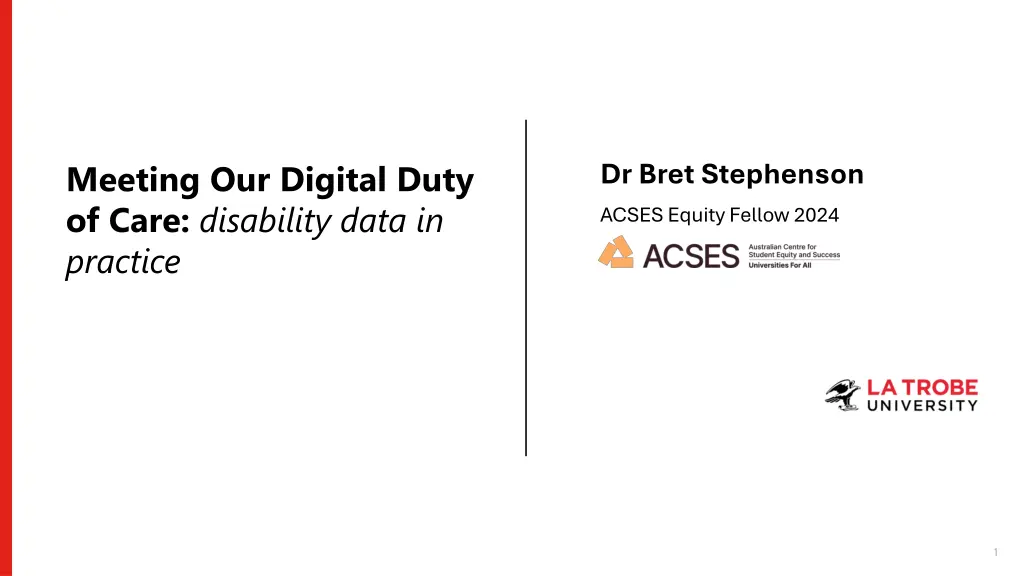
Digital Duty of Care: Empowering Equity in Disability Data
Explore the practical aspects of meeting our digital duty of care in disability data through the insightful perspectives of Dr. Bret Stephenson, a respected ACSES Equity Fellow. Delve into the intersection of student equity, data governance, and AI while addressing legislation, uni policies, practitioner insights, and emerging best practices. Uncover the importance of centering equity in data and digital governance amid power asymmetries and information vulnerabilities in a postdigital context.
Download Presentation

Please find below an Image/Link to download the presentation.
The content on the website is provided AS IS for your information and personal use only. It may not be sold, licensed, or shared on other websites without obtaining consent from the author. If you encounter any issues during the download, it is possible that the publisher has removed the file from their server.
You are allowed to download the files provided on this website for personal or commercial use, subject to the condition that they are used lawfully. All files are the property of their respective owners.
The content on the website is provided AS IS for your information and personal use only. It may not be sold, licensed, or shared on other websites without obtaining consent from the author.
E N D
Presentation Transcript
Meeting Our Digital Duty of Care: disability data in practice Dr Bret Stephenson ACSES Equity Fellow 2024 1
I respectfully acknowledge the Wurundjeri Woi-wurrung people, the Traditional Owners of the unceded lands on which I live and work (Melbourne). I pay my respects to their Elders past, present, and emerging, and recognise their continuing connection to country, waterways, culture, and community. I would also like to warmly welcome any Aboriginal and Torres Strait Islander peoples joining us today, and acknowledge your presence, your knowledge, and your contributions. 2
2024 ACSES Equity Fellowship Dr Bret Stephenson ACSES Equity Fellow 2024 Centring student equity in data and AI governance: informing policy to empower practice 3
2024 ACSES Equity Fellowship 1. Legislation and regulation (macro-level) What are unis required to do and how is this changing? 2. Uni policy analysis (meso-level) Four areas of focus What do unis say they are doing? 3. Practitioner interviews (micro-level) How is it going on the ground (challenges, risks, opportunities, and readiness for digital change)? 4. Emerging good practice How can we better centre equity concerns and voices in the digital age? 4
Let's keep in mind: power asymmetries, Why do we need to centre equity in data and digital governance? tensions between individual and group privacy/rights and differences in information vulnerability 5
Our context is now profoundly postdigital (Fawns, 2023) or sociodigital (Sriprakash et al. 2024) Characterised by: Why data and digital governance? Datafication quantification of human life through digital information (Meijas & Couldry, 2019) Digitalisation increasing integration of digital technologies into (nearly) all aspects of university operations (Komljenovic, J., 2022) 6
1. Digital technologies and data practices are co- constitutive. Why data and digital governance? Digital systems don t just transmit or process data they actively shape what is recognised as data, what remains hidden or exposed, and who holds power over it. 2. We are concerned with more than just data privacy. Two main reasons Digital harms surveillance, algorithmic bias, automated exclusion, psychological harms, platform dependence, group harms, etc. 7
To be clear When well governed, data and emerging digital technologies can bring significant benefits to individuals, groups, and to the broader public good. We need good data. We need empowering digital technologies. But we must also work to be good (transparent, responsible and critical) stewardsof our student s digital selves. 8
We do an awful lot of work in the grey But why is there so much grey? A quick look at the three levels of governance: Legislation/regulation (macro-level) Institutional policies (meso-level) Individual university staff views and experience at the coalface (micro-level) 9
Legislation and Regulation: Federal and State/Territory Macro-Level What universities are required to do. 10
Australias Fragmented Privacy Framework Privacy legislation is fragmented between Commonwealth and state and territory legislation. Health data legislation adds another level of state and territory fragmentation in relation to disability. Public universities operate under many different (state/territory) privacy frameworks, often with dual responsibilities. See ADCET s excellent resource: Privacy Legislation and Disability Services 11
A changing landscape In a May 2024 speech, Attorney-General Mark Dreyfus, argued that the Privacy Act 1988 (Cth) is woefully outdated and unfit for the digital age And that Australia can no longer afford to have inadequate privacy protections. Attorney-General Mark Dreyfus (Speech to the Privacy by Design Awards 2024) 12
A changing landscape In sum, its time to address the grey Privacy Act Review Report, released in February 2023 - 116 proposals to modernise Australia's privacy framework Government s response (Sept 2023): 38 Agreed, 68 Agreed in Principle, 10 Noted 13
Reforms are underway Tranche 1 Reforms (November 2024) addressed 23 agreed proposals Organisations must update their privacy policies to disclose when decisions are made through automated processes Clarifies reasonable steps to protect the security of personal information must implement both technical and organisational measures Tranche 2 Reforms (forthcoming) expected to: Modernise definitions of personal information and consent Implement a fair and reasonable test to take the privacy burden off individuals alone Enhance individual rights 14
Do Privacy Act 1988 (Cth) reforms apply to universities? Only the Australian National University (ANU) and private universities are strictly obligated to follow the Privacy Act. Most other Universities will have limited responsibility to follow the Privacy Act reforms: for HESA data collections, controlled entities, and under some contracts. Important Point Many universities voluntarily commit to following the more stringent federal Privacy Act. 15
Tensions between privacy and openness are particularly relevant Tension between the need for individual privacy/agency and group solidarity. Privacy law is largely focused on the individual, ignoring group inferences and group privacy erosions. the need to be both seen and unseen in data collections conditional or contextual visibility.
Tension between Nothing about us without us group solidarity and sovereignty or/and Nothing about me without me individual sovereignty and agency Digital Self-Determination (DSD)
Tensions between privacy and openness Office of the National Data Commissioner (ONDC) Office of the Australian Information Commissioner (OAIC) Data Availability and Transparency Act 2022 The independent national regulator for privacy and freedom of information. Provides the legal framework for the National Disability Data Asset We promote and uphold your rights to access government-held information and have your personal information protected. serve the public interest by promoting better availability of public sector data 18
Convention on the Rights of Persons with Disabilities (CRPD) Article 31 Statistics and data collection Article 22 Respect for privacy shall protect the privacy of personal, health and rehabilitation information of persons with disabilities on an equal basis with others. collect appropriate information, including statistical and research data, to enable and implement policies The need to be unseen or uncounted The need to be seen or counted 19
Analysis of University Policies Meso-Level What universities say they are doing 20
Analysis of University Disability Policies A (very) short summary Sector wide analysis of all Australian university (Table A) disability policies . The analysis is limited to publicly available policies and procedures that appear to be the primary policy statement(s) in institutional policy libraries. Disability Action Plans were out of scope. 21
Analysis of University Disability Policies 39 (Table A) Universities Included 12 Universities had no discernible policy dedicated to students with a disability. Some had SfSP or broad DEI policies that briefly mentioned the availability of disability support, while others only had staff policies. 27 Universities included in the analysis 22
Data and digital governance highlights 9 universities reference digital inclusion commitments/efforts 6 reference consultation or participation of people with disability in policy/governance 11 describe privacy protections that are unique to disability data 23
Data and digital governance highlights 9 describe internal handling/disclosure of Learning Access Plans and clarify distribution responsibilities. 14 indicate how students must evidence disability status most require medical/health Only 4 or 5 clarify the gap between disclosure at enrolment and disclosure to central support unit Very few indicate what data is reported to government. 24
Semi-Structured Interviews Micro-Level How is it going on the ground? Are we ready to meet our digital duty of care? 25
Participant Selection / Recruitment They are a staff member of an Australian public university (Table A), and; their role may be described as a student equity practitioner or someone significantly involved in providing support services to undergraduate students identified with an equity group. or, their role is significantly related to the senior leadership or management of student equity strategy and/or support services, or; their role is significantly related to the management or governance of student data and/or digital technologies. Recruitment via purposive sampling 26
Participant Profile 21 Participants Avg interview length of 62 minutes Role/Responsibilities University Distribution Position Level Equity All Evaluation All Disability 10 First Nations 5 Data/Eval 3 Data (Eval) Steward 5 Uni Groups All States/Territories 6 Unis 12 Executive 5 Director 5 Manager 5 Professional 6 Commitments to participant and institutional anonymity in the research ethics protocols allows only for high-level aggregate figures. 27
It's important to note the changing HE policy context during the course of this research and its influence on the topics of concern. There has been a lot going on! 28
Are we ready to cope with more personal data? In addition to setting targets, Government must improve data collection to understand and address more granular indicators of disadvantage better. (Final Report, p. 117) Calls for more personal/sensitive student data collections to identify and monitor additional equity groups, including: First-in-family students, mature-aged students, care leavers, refugees, carers, certain language groups, and prisoners. Particularly notes many problems with disability data collection/reporting. 29
Support for Students Policy There are additional concerns about student privacy and appropriate risk management concerning the handling of identifiable information that could be potentially damaging if mishandled (e.g. financial data, access history of wellbeing services, identification of at-risk status) without there being significant, obvious benefit to individual students. Universities Australia, Submission to the Support for Students Policy Guidelines Consultation Paper 30
Governance of equity evaluation activities in universities Raising issues concerning the governance of evaluation activities. While the governance of human research is well delineated, socialised and understood, the governance of evaluation activities often exists in the grey . Policies, procedures and guidelines? HREC approval? Privacy Impact Assessment (PIA)? Committee approval? Data Custodian/Steward approval? 31
Governance of equity evaluation activities 5.1.7 Institutions should have a clearly defined decision- making process for determining whether an activity is research or if it is another activity, such as quality assurance, and have separate mechanisms for the review and authorisation of each. These mechanisms should be set out in the institution s policies and procedures. 32
Greater guidance in health fields Irrespective of whether an activity is called research or QA or evaluation, those conducting the activity must consider whether the people involved (e.g. participants, staff or the community) will be exposed to any risk, burden, inconvenience or possible breach of their privacy. In many situations, oversight of the activity is required, but ethical review is not necessary. Organisations should develop policies on QA/evaluation which provide guidance for oversight of QA or evaluation activities. 33
Views on the maturity of data management, governance and processes Many participants report low levels of maturity So, [our university] I would say, is at a relatively early stage in terms of its digital infrastructure and it's at an even earlier stage in terms of its data governance, particularly in relation to equity data. (Director) And, you know, speaking very candidly, which I am comfortable doing So, I don't think our data governance has got to a very mature state in relation to this. (Director) Areas of high, but localised, maturity And look there will be, absolutely, pockets of excellence at [the university] that I'm not representing because there'll be people who live and breathe this stuff. (Executive) 34
Is data/digital policy well socialised and influencing practice? So, policies, whether they exist or not, are certainly not in the culture. (Manager) There's a gap between what is rhetoric and what is well, it is just rhetoric What the practise is, is not what is clearly stated in the rules. [we have lots of policies] these are the rules. There's no connection. It's fully known. It's not like, whoops there's a gap! (Manager) No not particularly well socialised. Yeah, I think there's a lot of vibes that vary from team to team. But yeah, no, not like a socialised idea of this is what we should use it for. This is what we can't use it for because it's too private... I don't think people have really had that conversation. (Professional) 35
Views on transparency and consent But my view is that it's probably not explicit and clear enough about how we govern that [internal access to student equity data] across the institution and it's a bit slippery. (Executive) I mean while we take all this information from students, we never talk to them about how it gets used or how it s going to go sit on this dashboard. (Manager) I think that we need to be more robust in the way in which we evidence voluntary and informed consent for the use of those data. (Executive) 36
Gatekeepers and Local Heroes Manyparticipants mentioned individual data gatekeepers, who are privacy, equity and human-rights minded . They step-in to make up for poor institutional governance. Although some more junior gatekeepers report that expressing their concerns to seniors can be career limiting . 37
Who owns the data?: conflicting data privacy cultures [We frequently have the problem of] whose data is it? that's been coming up in both our disability and our counselling team, we have a lot of clinicians of various types obviously counsellors and OTs and different kinds of clinicians, social workers that come into work in these teams and we have policies and procedures that are quite strict But we're also in this department with these multiple teams supporting a student moving through and everyone's, you know, trauma informed now, so we can't repeat our stories. So, we've had these kind of challenges where an individual team is like [no, you can t have any of this data] Whereas [the university] wants a bit more flow. (Director) 38
Data and digital systems frequently unfit for disability support work Unfit CRMs So, at [the university], the CRM that we are using is out of date and incredibly clunky and not flexible.And the disability team have to work by pen and paper or Excel spreadsheets (Manager) On Learning Access Plan distribution: we have data security concerns around the platform that we use as well we have concerns about who can access that data sometimes. So, we're having to deplatform and consider what we move it to. But at the moment it's Excel spreadsheets and PDFs which is less than ideal. (Executive) 39
Data and digital systems for disability work often poorly resourced The process of having the [disability] data management system built was horrendous and having it matched to our needs, it was the most unpleasant process I've ever been through in my university career. (Manager) The university is now looking at [a particular software product] and it's been years of just non-stop meetings and we're not a priority despite that we keep being told we areand then we're not (Manager) 40
The AI excitement and worry among disability/accessibility support staff Excitement It's been an extraordinary enabler students said. And I think we're only just starting to look at the possibilities [It can provide] agency, absolutely, the capacity to work in a workplace, the capacity to act independently. We have an absolute responsibility in higher education to teach students about this stuff and to teach them how to use it. (Manager) 41
The AI excitement and worry among disability/accessibility support staff Worries [Regarding DA staff entering student information into generative AI] now that information is somewhere on the record and [in the cloud]. So where is the do no harm? We have seen the harm that can come even with the best intentions. But people are just giving the data over freely into some of these tools unchecked. (Professional) 42
Part 4: Examples of good, innovative and emerging practice 43
The Enterprise Data Ethics Framework provides a consistent enterprise-wide approach for the ethical use of data for non- research purposes across The University of Queensland (UQ). Internal data sharing agreements Data ethics principles and handbook Handbook for Information Stewards Several training courses available to staff Data Ethics Advisory Group - responsible for reviewing and providing advice in non-research data use cases. https://data.uq.edu.au/enterprise-data-ethics-framework 44
Equity, Diversity, Inclusion and Ethics in Data Advisory Group The objective of the EDIE in Data Advisory Group is to consider and advise on matters pertaining to equity, diversity, inclusion, and ethics in data as they relate to the management and use of information across UniSC. Protocols address 1. Data consent and transparency 2. Data minimisation collect only necessary data 3. Respect data privacy and confidentiality 4. Actively promote inclusion and fair representation 5. Ensure transparency in data and decision-making 6. Engage in ethical data practices and governance 7. Continuous learning and improvement Currently in draft - 45
Utilising a Deliberative Mini-Public (DMP) to develop principles to govern the use of analytics and artificial intelligence in teaching and learning at UTS. To increase diversity of representation and minimise response bias, the DMP was selected through stratified sampling. Demographic attributes: Gender, Indigenous (self- identified), English as a Second Language (ESL), Undergraduate (Years 1 4), Postgraduate, Staff (Academics and Tutors), and Faculty 20 participants recruited from 131 applicants Swist, T., Buckingham Shum, S. & Gulson, K.N. Co-producing AIED Ethics Under Lockdown: an Empirical Study of Deliberative Democracy in Action. Int J Artif Intell Educ 34, 670 705 (2024). https://doi.org/10.1007/s40593-023-00380-z 46
Are we ready to be good stewards of student information in the digital age? What are your thoughts on our digital duty of care? Are we meeting it? 47
REFERENCES Fawns, T. (2023). Postdigital Education. In P. Jandri (Ed.), Encyclopedia of Postdigital Science and Education (pp. 1 11). Springer Nature Switzerland. https://doi.org/10.1007/978-3-031- 35469-4_52-1 Komljenovic, J. (2022). The future of value in digitalised higher education: Why data privacy should not be our biggest concern. Higher Education, 83(1), 119 135. https://doi.org/10.1007/s10734-020-00639-7 Mejias, U. A., & Couldry, N. (2019). Datafication. Internet Policy Review, 8(4). https://doi.org/10. 14763/2019.4.1428 Sriprakash, A., Williamson, B., Facer, K., Pykett, J., & Valladares Celis, C. (2024). Sociodigital futures of education: Reparations, sovereignty, care, and democratisation. Oxford Review of Education, 1 18. https://doi.org/10.1080/03054985.2024.2348459 48

